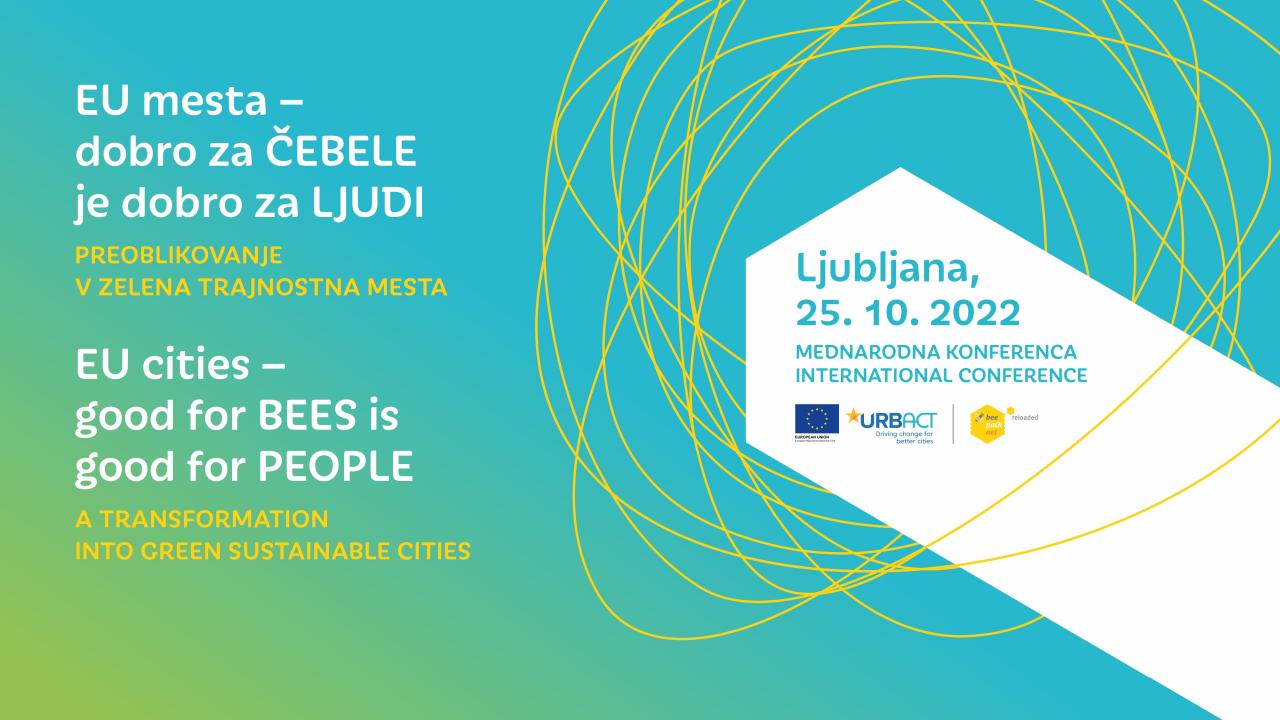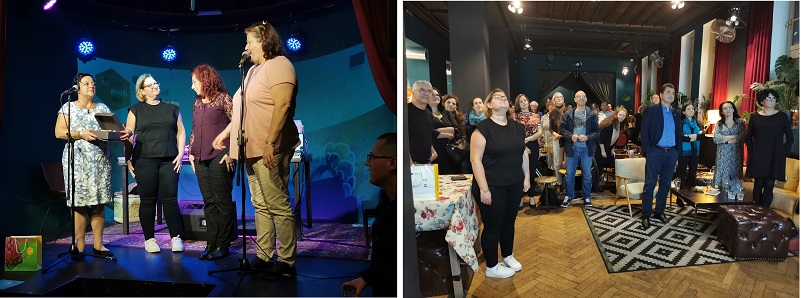
The final conference titled 'EU cities - good for BEES is good for PEOPLE, a transformation into green sustainable cities’ was the conclusion of the transfer of sustainable urban beekeeping knowledge from Ljubljana to nine EU cities (BeePathNet and BeePathNet Reloaded). The event that took place in Ljubljana (25th October 2022) joined residents of over 45 cities and 17 different countries worldwide either in person or virtually. It was also the official launch of the international network of Bee Path Cities – the movement that will continue to promote the vision of creating cities that are “good for pollinators and therefore good for people” beyond the project. Conference presentations and videos including the Philosophy of Bee Path Cities and guidelines for new cities to implement the movement are available on network web page.
Final words of Maruška Markovčič Ljubljana BEE PATH’s initiator, the Queen Bee of urban beekeeping knowledge transfer and Bee Path Cities international network, from the City of Ljubljana:
“I see this as a new beginning of new times!
Everybody is a spokesperson. Take the Bee Path Cities Philosophy and invite cities to join.
Thank you for swarming with us!”.
![]()
The article is available in English and all 5 partner languages:
Български, English, Hrvatski, Italiano, Polski, Slovenščina
![]()
The final conference titled 'EU cities - good for BEES is good for PEOPLE, a transformation into green sustainable cities’ was the conclusion of a year and a half long journey of the BeePathNet Reloaded project. On the 25th October 2022 we met in hybrid form where we were joined by residents of over 45 cities and 17 different countries worldwide.
The conference was opened with a welcome speech by Dejan Crnek, deputy mayor of the City of Ljubljana and Peter Kozmus, Slovenian Beekeepers’ Association and the vice president of Apimondia. Maruška Markovčič, the project initiator and coordinator presented the journey from Ljubljana’s BEE PATH to the BeePathNet Reloaded partnership.
In the following session eminent speakers Adele Bucella (URBACT), dr. Fani Hatjina (APIMONDIA) and dr. Danilo Bevk (National Institute of Biology) talked about different aspects of sustainable urban development. Participants then discussed different aspects of urban beekeeping with the aim of ensuring sustainable and environmentally friendly cities.
After the break project partners from BeePathNet Reloaded presented the work they did on their bee paths and the challenges they faced. Ivan Doktorov (Bansko, Bulgaria), Mara Sugni (Bergamo, Italy), Helena Kolenić (Osijek, Croatia), Edyta Wykurz (Sosnowiec, Poland); and Branka Trčak and Nina Ilič (Ljubljana, Slovenia) all shared their experiences with the transfer of the good practice.
All 9 cities, that transferred Ljubljana’s urban beekeeping good practice, obligated themselves to keep on implementing pollinators friendly activities also after the official project’s end and to spread the movement round Europe. To set the common understanding and role of this partnership, Vesna Erhart, network communication officer presented the key principles and aims of the Bee Path Cities international network philosophy. The network was officially launched by Nataša Jazbinšek Seršen, head of the department for environmental protection in the City of Ljubljana. With this all EU cities are invited to join the international network of Bee Path Cities and follow in founding members’ footsteps.
In the round table all 9 partner cities (BeePathNet and BeepathNet Reloaded) presented the situation regarding pollinators and the effects the project had on their cities. It was moderated by Klemen Strmšnik, URBACT lead expert, and Ed Thorpe, URBACT expert and its key point was discussion of future plans at city level and common activities of the newly established network Bee Path Cities. In Ljubljana we were joined by Maruška Markovčič (Ljubljana, Slovenia), Attila Varga (Hegyvidek, 12th District of Budapest, Hungary), Elisavet Papoulidou (Nea Propontida, Greece), Tsvetanka Obetsanova (Bansko, Bulgaria), Mara Sugni (Bergamo, Italy), Helena Kolenić (Osijek, Croatia) and Edyta Wykurz (Sosnowiec, Poland). Joining us online were Justyna Olszewska (Bydgoszcz, Poland), Elena Giovannini (Cesena, Italy) and Ana Lirio (Amarante, Portugal).
More info is available on the following webpages:
- BeePathNet Reloaded project: www.urbact.eu/beepathnet-reloaded
- Bee Path Cities international network: www.urbact.eu/bees
Key final conference and BeePathNet Reloaded outputs:
- Conference Programme (EN, SI)
- BeePathNet Reloaded Final book (EN, SI)
- Evolving into a Bee Path City – short guidelines (EN, SI, BG, DE, EL, ES, FR, HR, HU, IT, PL, PT)*
- Bee Path Cities Philosophy (EN, SI, BG, EL, FR, HR, HU, IT, PL, PT)
Comments: In addition to the English and Slovenian language version the short guidelines will be available in several other EU languages shortly on the international network webpage www.urbact.eu/bees.
Conference videos and presentations:
You can choose between videos in English and Slovenian language. Link to the presentation is under speaker’s name.
Welcome speech
- Dejan Crnek, deputy mayor of the City of Ljubljana (EN, SI)
- Peter Kozmus, Slovenian Beekeepers’ Association (EN, SI)
- From Ljubljana’s BEE PATH to the BeePathNet Reloaded partnership. Maruška Markovčič, Ljubljana BEE PATH initiator and BeePathNet Reloaded project manager, City of Ljubljana (EN, SI)
Sustainable Urban Development for Pollinators and Citizens
- URBACT – the Honeypot for European Cooperation. Adele Bucella, Head of Unit in the URBACT programme secretariat (EN, SI)
- How Urban Development Focusing on Nature can Help Humans and Bees; Examples and Lessons Learned; Dr. Fani Hatjina, the President of APIMONDIA’s Bee Health Scientific Commission and the ULG coordinator for Nea Propontida (EN, SI)
- No Pollinator Diversity Means no Food Security. Dr. Danilo Bevk, researcher at the Department of Organisms and Ecosystems Research, National Institute of Biology (NIB) (EN, SI)
- Discussion (EN, SI)
Transfer of Ljubljana’s Good Practice on Urban Beekeeping to EU Cities (EN, SI)
- Bansko Bee Path – Where Heritage meets Education. Ivan Doktorov, the Municipality of Bansko, Bulgaria
- In Bergamo, Citizens and Institutions Act Together for a ‘Bee and Pollinator-Friendly’ City. Mara Sugni, Botanical Garden, the Municipality of Bergamo, Italy
- The New Cradle of Beekeeping. Helena Kolenić, the Municipality of Osijek, Croatia
- Bees for Dummies. Edyta Wykurz, the Municipality of Sosnowiec, Poland
- Recent Evolution of Ljubljana’s Bee Path. Branka Trčak, the City of Ljubljana, Slovenia
- Api-Education Programme in Ljubljana. Nina Ilič, Institute Eneja, Slovenia
Bee Path Cities Philosophy and Bee Path Cities network launch (EN, SI)
Vesna Erhart, network communication officer
Maruška Markovčič, Ljubljana BEE PATH initiator and BeePathNet Reloaded project manager, City of Ljubljana
Nataša Jazbinšek Seršen, head of Department for Environmental protection, City of Ljubljana
Round table: Pollinators and Citizens – A Friendly Evolution of EU Cities (EN, SI)
Moderator: Klemen Strmšnik, URBACT lead expert and Ed Thorpe, URBACT expert
Representatives of Amarante (Portugal), Bansko (Bulgaria), Bergamo & Cesena (both Italy), Bydgoszcz & Sosnowiec (both Poland), Hegyvidek (Budapest, Hungary), Ljubljana (Slovenia), Nea Propontida (Greece) and Osijek (Croatia).








